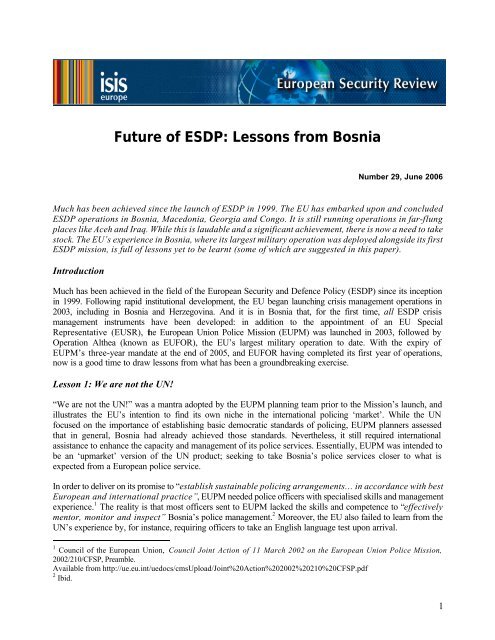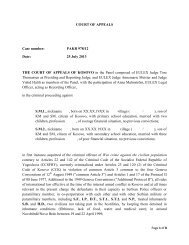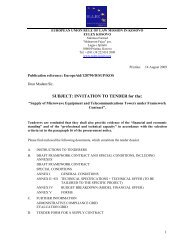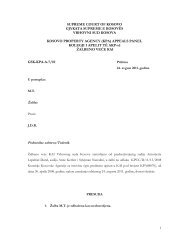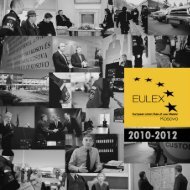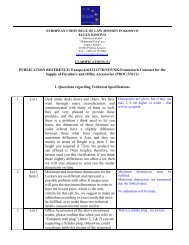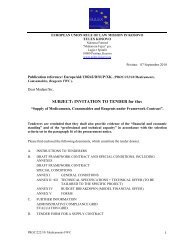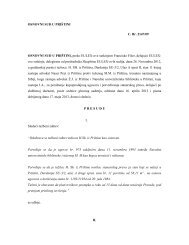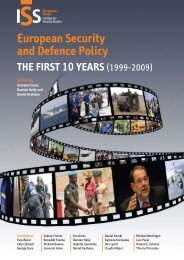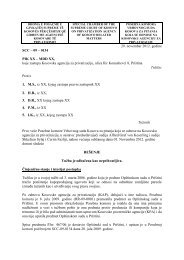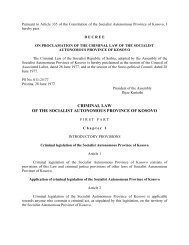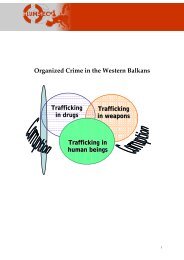Future of ESDP: Lessons from Bosnia by Dominique Orsini - Eulex
Future of ESDP: Lessons from Bosnia by Dominique Orsini - Eulex
Future of ESDP: Lessons from Bosnia by Dominique Orsini - Eulex
- No tags were found...
You also want an ePaper? Increase the reach of your titles
YUMPU automatically turns print PDFs into web optimized ePapers that Google loves.
<strong>Future</strong> <strong>of</strong> <strong>ESDP</strong>: <strong>Lessons</strong> <strong>from</strong> <strong>Bosnia</strong>Number 29, June 2006Much has been achieved since the launch <strong>of</strong> <strong>ESDP</strong> in 1999. The EU has embarked upon and concluded<strong>ESDP</strong> operations in <strong>Bosnia</strong>, Macedonia, Georgia and Congo. It is still running operations in far-flungplaces like Aceh and Iraq. While this is laudable and a significant achievement, there is now a need to takestock. The EU’s experience in <strong>Bosnia</strong>, where its largest military operation was deployed alongside its first<strong>ESDP</strong> mission, is full <strong>of</strong> lessons yet to be learnt (some <strong>of</strong> which are suggested in this paper).IntroductionMuch has been achieved in the field <strong>of</strong> the European Security and Defence Policy (<strong>ESDP</strong>) since its inceptionin 1999. Following rapid institutional development, the EU began launching crisis management operations in2003, including in <strong>Bosnia</strong> and Herzegovina. And it is in <strong>Bosnia</strong> that, for the first time, all <strong>ESDP</strong> crisismanagement instruments have been developed: in addition to the appointment <strong>of</strong> an EU SpecialRepresentative (EUSR), the European Union Police Mission (EUPM) was launched in 2003, followed <strong>by</strong>Operation Althea (known as EUFOR), the EU’s largest military operation to date. With the expiry <strong>of</strong>EUPM’s three-year mandate at the end <strong>of</strong> 2005, and EUFOR having completed its first year <strong>of</strong> operations,now is a good time to draw lessons <strong>from</strong> what has been a groundbreaking exercise.Lesson 1: We are not the UN!“We are not the UN!” was a mantra adopted <strong>by</strong> the EUPM planning team prior to the Mission’s launch, andillustrates the EU’s intention to find its own niche in the international policing ‘market’. While the UNfocused on the importance <strong>of</strong> establishing basic democratic standards <strong>of</strong> policing, EUPM planners assessedthat in general, <strong>Bosnia</strong> had already achieved those standards. Nevertheless, it still required internationalassistance to enhance the capacity and management <strong>of</strong> its police services. Essentially, EUPM was intended tobe an ‘upmarket’ version <strong>of</strong> the UN product; seeking to take <strong>Bosnia</strong>’s police services closer to what isexpected <strong>from</strong> a European police service.In order to deliver on its promise to “establish sustainable policing arrangements… in accordance with bestEuropean and international practice”, EUPM needed police <strong>of</strong>ficers with specialised skills and managementexperience. 1 The reality is that most <strong>of</strong>ficers sent to EUPM lacked the skills and competence to “effectivelymentor, monitor and inspect” <strong>Bosnia</strong>’s police management. 2 Moreover, the EU also failed to learn <strong>from</strong> theUN’s experience <strong>by</strong>, for instance, requiring <strong>of</strong>ficers to take an English language test upon arrival.1 Council <strong>of</strong> the European Union, Council Joint Action <strong>of</strong> 11 March 2002 on the European Union Police Mission,2002/210/CFSP, Preamble.Available <strong>from</strong> http://ue.eu.int/uedocs/cmsUpload/Joint%20Action%202002%20210%20CFSP.pdf2 Ibid.1
Unless the EU streamlines its crisis management procedures and structures in Brussels, defines what it has to<strong>of</strong>fer more clearly, and improves its coherence on the ground, <strong>ESDP</strong> will not fulfil its true potential.<strong>Dominique</strong> <strong>Orsini</strong> 55 <strong>Dominique</strong> <strong>Orsini</strong> wrote a doctoral thesis at the London School <strong>of</strong> Economics on post-war security-sector reform in<strong>Bosnia</strong>. He worked (2003-2005) as a political advisor for the European Union Police Mission (EUPM) and wasinvolved in the planning <strong>of</strong> EUPM II in Brussels in late 2005. He currently serves with the United Nations inAfghanistan. The views expressed in this paper are the author’s and do not necessarily represent the views <strong>of</strong> theEuropean Union or the United Nations. The author welcomes comments at: dominique.orsini@excite.com.5


